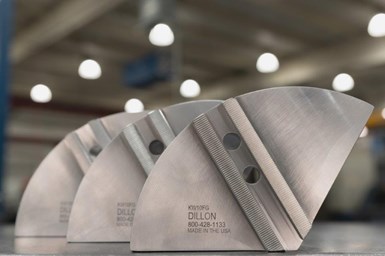Dillon's Extruded Aluminum Pie Jaws Maximize Contact Area
Eastec 2023: The company’s full-grip pie jaws are machined from aluminum barstock, meaning they have none of the porosity inherent with castings.
Share





Dillon Manufacturing showcases its pie jaws made from 6061 extruded aluminum — now available up to 28" in diameter — in booth 5445 at Eastec 2023.
Because they are machined from aluminum barstock, these large-diameter, full-grip pie jaws have none of the porosity inherent with castings, so they are stronger, more reliable and safer than cast aluminum. They can also be made in diameters larger than the chuck, increasing the chucks capacity. Maximum contact area from the full-grip jaws provides a solid gripping surface that yields more friction for drive with reduced part distortion. Custom designs available with special heights, diameters and configurations, including a matching serration location that is perpendicular to the slots.
Dillon full-grip chuck jaws are made in the U.S. with lead times of typically two weeks or less. According to the company, they are ideal for high-speed machining, precision boring, tapping, drilling and finishing across most industrial markets. In addition to 6061 extruded aluminum, Dillon’s full-grip pie jaws are available in brass, 1018 steel and cast iron.
These wrap-around-type top jaws distribute more of the gripping pressure across the workpiece, reducing part distortion. Dillon standard and custom full-grip jaws are available in 1.5 mm × 60°, 3.0 mm × 60°, 1/16 × 90° or 3/32 × 90° serrations, American standard or tongue and groove, Acme and square-serrated, key-type mounting interfaces.
Dillon chuck jaw products are ISO 9000-2015 registered.
Related Content
-
Parts and Programs: Setup for Success
Tips for program and work setups that can simplify adjustments and troubleshooting.
-
Prioritizing Workholding Density Versus Simplicity
Determining whether to use high-density fixtures or to simplify workholding requires a deeper look into the details of your parts and processes.
-
Lean Approach to Automated Machine Tending Delivers Quicker Paths to Success
Almost any shop can automate at least some of its production, even in low-volume, high-mix applications. The key to getting started is finding the simplest solutions that fit your requirements. It helps to work with an automation partner that understands your needs.

























